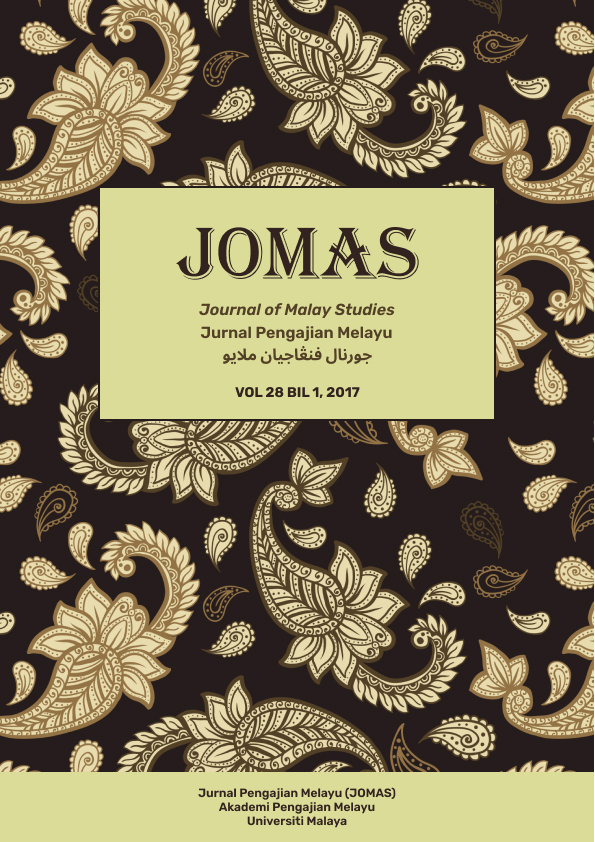MAKNA SOSIAL DALAM KATA PANGGILAN: KAJIAN ETNOGRAFI KOMUNIKASI DALAM KOMUNITI BAHASA MELAYU SAMBAS SOCIAL MEANING IN ADDRESS FORMS: AN ETHNOGRAPHIC STUDY OF COMMUNICATION IN THE SAMBAS MALAY COMMUNITY
Main Article Content
Abstract
Merujuk pada konsep-konsep tentang penggunaan bentuk panggilan
yang bersifat dinamik mengikut konteks, penyelidikan ini mengambil
berbagai-bagai konteks peristiwa komunikasi formal dan tak formal dengan
latar belakang situasi hubungan sosial kekeluargaan, kejiranan dan
rakanan. Kajian ini mempunyai dua objektif. Pertama, untuk menganalisis
sistem panggilan yang berlaku dalam komuniti bahasa Melayu Sambas
(BMS) mengikut konteks peristiwa komunikasi formal dan tak formal.
Kedua, untuk mentafsir makna sosial yang wujud akibat penggunaan
bentuk panggilan berdasarkan konteks tersebut. Model analisis yang
digunakan ialah pendekatan etnografi komunikasi (ethnography of
speaking). Kajian lapangan dengan perakaman peristiwa tuturan dan temu
bual tak berstruktur diterapkan dalam penyelidikan ini. Hasil dapatan
penyelidikan menunjukkan bahawa bentuk panggilan dalam komuniti
BMS mengambil berbagai-bagai bentuk kelas kata. Secara am, penggunaan
bentuk panggilan itu mewujudkan makna rujukan kedudukan, pangkat,
usia serta gender orang yang dipanggil serta bentuk hubungan dengan orang yang memanggil. Adapun berdasarkan konteks, makna penggunaan
bentuk panggilan itu boleh bertukar menjadi makna-makna sosial yang
bervariasi. Makna-makna tersebut berhubung kait dengan nilai-nilai atau
norma-norma yang berkenaan dengan kewujudan struktur dan sistem
kekeluargaan serta sistem sosial yang berlaku dalam komuniti BMS. Secara
khas, nilai-nilai tersebut meliputi norma-norma keformalan, kesopanan,
penghormatan atau penghargaan, norma-norma yang berkenaan dengan
ciri-ciri kekeluargaan (in-goup) serta norma-norma yang berkenaan dengan
jarak hubungan (out-group). Nilai-nilai lainnya adalah yang berkenaan
dengan suasana hati dan fikiran penutur semasa peristiwa komunikasi
itu berlangsung seperti suasana kemesraan atau keintiman, kemarahan,
kesayangan, hubungan setakat kenal atau baru kenal, serta nilai-nilai
pembelajaran dalam berbudi bahasa (membahasekan anak).
Kata Kunci: kata panggilan, konteks, makna sosial, etnografi komunikasi.
With reference to the concepts of dinamic usage of address forms in context, this
research takes various formal and informal communicative events within the
social contexts of kinship, neighbourhood, and friendship. It has two objectives.
The first is to conduct a contextual analysis of the system of address used in the
Sambas Malay speech community. The second is to interpret the social meanings
implied from the usage of the address forms in such contexts. The analysis
model applied is the ethnography of communication approach, and uses field
study of speech events obtained through recordings and unstructured interviews.
The findings show that the address forms in the Sambas Malay speech
community take various word classes. In general, the usage of address forms
implies the referential meanings of status, position, age and gender of the
addressee, as well as his/her role or relationship to the addresser. However, the
meaning in context can change depending upon social meaning. Those
meanings are related to the values and norms which refer to the structure and
system of kinship, as well as the social system that exists in the Sambas Malay
speech community. Specifically, those values include the norms of formality,
politeness, and respect, and those that deal with kinship characteristics (ingroup),
as well as social distance (out-group). The other values are related to mood, such as intimacy, dissapointment, endearment, new acquaintance and
the values of language manners taught to children.
Keywords: Terms of address, context, social meaning, ethnography of
communication.

